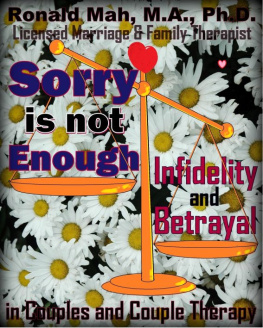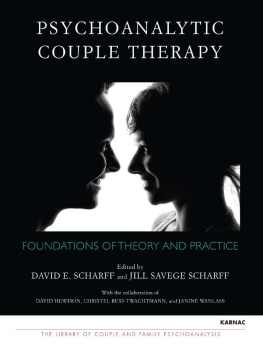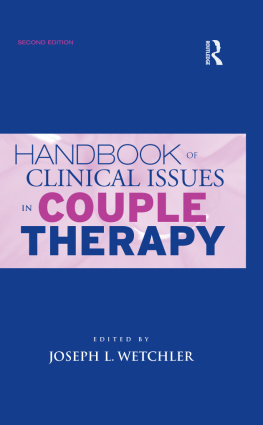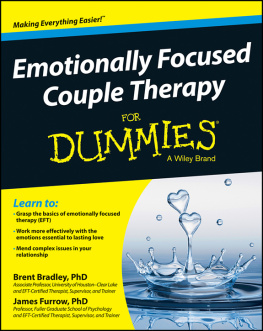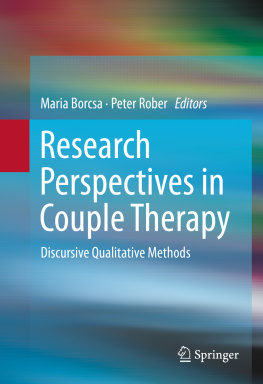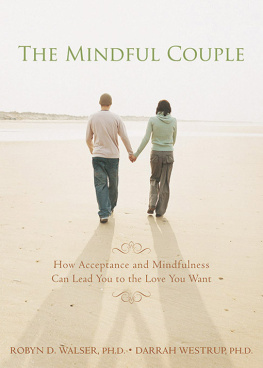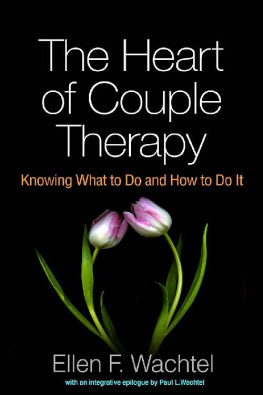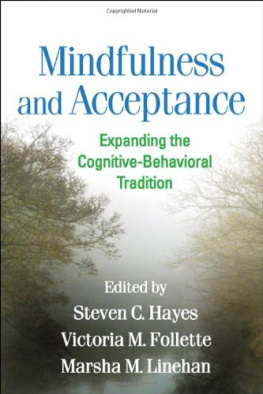Contents
Guide
Page List
To our families
Andys wife Louise and children Lisa and Sean
Brians wife Mandy and children Abby and Matthew
who have accepted us and changed us in ways both big and small
ADVANCE PRAISE
In 2008, the search began to select an intervention to promote VA healthcare when Congress mandated those eligible for the Department of Veterans Affairs Health Services have access to couple counselling. Selection criteria included strong empirical support, appeal to clinicians trained in either cognitive-behavioral or acceptance-based approaches, manualization, and developers who were enthused about collaborating with the VA. Integrative Behavioral Couple Therapy (IBCT) fit the bill, and thousands of veterans have now participated in the intervention, to great effect. The text here updates and expands IBCT in an accessible, engaging format replete with clinical wisdom and practical guidance.
Shirley M. Glynn, Ph.D., Research Psychologist, Semel Institute of Neuroscience and Human Behavior, UCLA
Integrative Behavioral Couple Therapy is the premier couple therapy for addressing the central concepts of acceptance and behavior change in intimate relationships. Developed by internationally recognized leaders in the couple therapy field, IBCT is easy for therapists to learn, is well-received by couples, and has strong empirical support. This book includes the latest thinking regarding acceptance and behavior change strategies, along with innovative applications of the treatment to diverse populations and specific complex problems. This volume will be a classic.
Donald H. Baucom, Ph.D., Distinguished Professor of Psychology and Neuroscience, University of North Carolina at Chapel Hill, author of Treating Relationship Distress and Psychopathology in Couples
Integrative Behavioral Couple Therapy is a book every therapist and student training to be a therapist needs to read. This book tells the story of one of the most important innovations in the therapy field the last few decades, and not just in the couples therapy field. The IBCT approach to helping partners improve their relationships and lives is based on over 40 years of research and clinical practice. The lead author is one of the most esteemed psychologists on the planet, whose work is widely respected and has had a positive impact on countless therapists and couples. The second author is one of the best and brightest young psychologists in the couples field, who is destined to continue to make outstanding contributions. The third author, who sadly passed away too young, is still seen as one of the most important contributors to clinical and family psychology, and his work lives on in this book. Partners will want to read this book to discover skills and principles that will help them as they put what they learn into practice. Your work with people struggling with relationship issues will be forever changed when you read this book.
Howard J. Markman, Ph.D., Distinguished
Professor of Psychology, University of Denver, author of Fighting FOR Your Marriage
This book is essential reading for anyone participating in couple therapy. Powerful case examples bring underlying principles to life. Reading session accounts is like being in the therapy room, watching these experts in action. Integrative Behavioral Couple Therapy challenges traditional ideas about couple therapy through integration with online programs, such as OurRelationship.com. In addition, it expands IBCTs applicability to diverse couples and high-stakes issues, including infidelity and violence. This book offers enormous wisdom for both seasoned and new couple therapists.
Gayla Margolin, Ph.D., Professor, Department of Psychology, University of Southern California
SCIENCE IS CUMULATIVE. Any evidence-based knowledge necessarily builds on previous evidence; on previous information. However large or small the contribution that one makes to this body of knowledge, one owes the people who previously contributed. In addition, science is collaborative. Whatever any of us contributes, we are able to do so because we had mentors, role models, and colleagues who nurtured, supported, challenged, and inspired us. It would be impossible to acknowledge all the people who influenced me and this work, but I am going to try to mention the ones of whom I am most aware.
Of most importance was the late Neil S. Jacobson and Brian D. Doss, the co-authors of this book. Neil and I developed Integrative Behavioral Couple therapy, wrote the first book about it (Jacobson & Christensen, 1996), and did the initial research on it (see in this book is devoted to the OurRelationship program and discusses how it can be integrated with in-person IBCT.
There are many others that deserve acknowledgment and I will discuss them in more or less chronological order. There is Robert Weiss, one of the founders of behavioral couple therapy and my clinical supervisor of couple therapy during graduate school. Wise and wily, he was a living contradiction of any argument that behavioral approaches were mechanistic. I saw my first couple case, as well as a group for couples, with fellow graduate student, Gayla Margolin, as my co-therapist and Weiss as our supervisor. When Gayla and I ended up at separate universities in Los AngelesGayla at the University of Southern California and me at the University of California, Los Angeleswe collaborated on a major federal grant studying the impact of couple therapy and family therapy. Throughout our graduate career and the many years since, Gayla has been that ideal combination of friend and colleague. Early in my career at UCLA, I met the late Harold Kelley, an influential social psychologist who wanted to put the study of close relationships on solid scientific grounds, obtained funding from the National Science Foundation for this endeavor, and invited me to join him and a group of clinical and social psychologists to write a book giving this burgeoning field direction (Kelley et al., 1983; 2002). What an incredible opportunity that was, and what an impact on my thinking about relationships. Dan Wile, an astute clinician, influenced my thinking through his writings, even though he came from a dramatically different theoretical perspective. However, perhaps the most direct influence on my thinking about couples came from my extensive clinical work with couples, either directly through my private practice which I continued throughout my career, or indirectly through the therapists I supervised. The messiness of real couples and their difficulties is a constant reality check on our oversimplified theories and interventions.
For our clinical trials of IBCT, we selected experienced, reputable, licensed professional therapists and trained them in IBCT. During our first pilot clinical trial of IBCT, we worked with Steve Clancy, Peter Fehrenbach, Joan Fiore, Susan Price, and Deborah Wilk. During our major two-site clinical trial of IBCT, we worked with Alfredo Crespo, Shelly Harrell, Megan Sullaway, and Anthony Zamudio in Los Angeles, and Peter Fehrenbach, Carol Henry, Christopher Martel, and Deborah Wilk in Seattle. To conduct these clinical trials, we depended on the help of a group of talented graduate students at UCLA and at the University of Washington, all of whom are now PhDs themselves. They did clinical assessments of the couples and helped run the day-to-day operations: Brian Baucom, Katherine Williams Baucom, Lisa Benson, Brian Doss, Kathleen Eldridge, Krista Gattis, Janice Jones, Meghan McGinn, Felicia De La Garza Mercer, Mia Sevier, and Lorelei Simpson were graduate students with me at UCLA; David Atkins, Sara Berns, Jean Yi, and Jennifer Wheeler were graduate students on the project at the University of Washington. During graduate school and afterward, David Atkins served as our statistical guru, analyzing and helping us make sense of the data.



